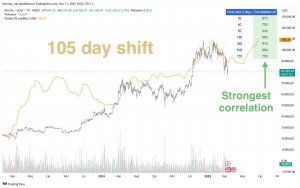Why a Dollar Today Is Worth More than a Dollar Tomorrow

You hear the term ‘time value of money’ everywhere in business, but it is not as clear-cut as it might seem.
The principle behind the concept is that money can be used to earn money over time, and so it is worth more now than it is in the future (Beers, 2018). Most directly, money can be invested to earn interest (Beers, 2018). It could also be invested for capital gains or it could be employed to generate wealth in other ways, which could in turn generate a return in the form of income (Beers, 2018).
The common saying is that a dollar today is worth more than a dollar tomorrow (Beers, 2018). The concept can be illustrated with an example: $100 invested today earning 5% interest would be worth $105 after one year, so $100 now is worth $105 in a year to someone who expects a 5% return.

Calculate your present value or future value using the time value of money.
By the same token, future cash flows are discounted by the rate of return to reflect the present value (Beers, 2018). A promise of $100 a year from now can be discounted by 5% so that it is really worth about $95 for the person who expects a 5% return.
This principle can be used by executives to help improve financial decisions. We see this on a personal plane as with the decision to buy or rent a home (Cleary & Foerster, 2015). And we see this on a corporate level as with the decision regarding near-term and long-term earnings or debt (Kokemuller, n.d.).
For example, a company that sells goods on credit must factor in the opportunity cost of not being paid in cash, which could otherwise be invested for interest (Kokemuller, n.d.). The cost of selling goods on credit is the amount of interest the company could earn if they could invest the cash (Kokemuller, n.d.).
Blackman (2014) argues that the time value of money should be referenced any time a financial decision is being made because the financial climate is such that money can always be used to earn an amount of interest, and so all alternative uses should be able to make equal or more money to be considered financially sound.
References
Beers, B. (2018). Why the time value of money matters to investors. Retrieved from https://www.investopedia.com/ask/answers/033015/why-time-value-money-tvm-important-concept-investors.asp
Blackman, A. (2014). Make better business decisions using the time value of money. Retrieved from https://business.tutsplus.com/articles/make-better-business-decisions-using-the-time-value-of-money–cms-19324
Cleary, S., Foerster, S. (2015). Time value of money: the buy versus rent decision. Retrieved from https://hbsp.harvard.edu/download?url=%2Fcourses%2F688826%2Fitems%2FW14403-PDF-ENG%2Fcontent&metadata=e30%3D
Kokemuller, N. (n.d.). How does the time value of money affect businesses? Retrieved from https://smallbusiness.chron.com/time-value-money-affect-businesses-67164.html






